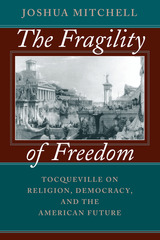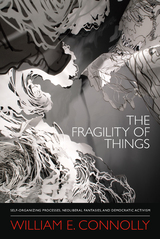4 books about Fragility

The Fragility of Freedom
Tocqueville on Religion, Democracy, and the American Future
Joshua Mitchell
University of Chicago Press, 1995
In this fresh interpretation of Tocqueville's thought, Joshua Mitchell explores the dynamic interplay between religion and politics in American democracy.
Focusing on Democracy in America, The Fragility of Freedom examines Tocqueville's key works and argues that his analysis of democracy is ultimately rooted in an Augustinian view of human psychology. As much a work of political philosophy as of religion, The Fragility of Freedom argues for the importance of a political theology that recognizes moderation.
"An intelligent and sharply drawn portrait of a conservative Toqueville."—Anne C. Rose, Journal of American History
"I recommend this book as one of a very few to approach seriously the sources of Tocqueville's intellectual and moral greatness."—Peter Augustine Lawler, Journal of Politics
"Mitchell ably places Democracy in America in the long conversation of Western political and theological thought."—Wilfred M. McClay, First Things
"Learned and thought-provoking."—Peter Berkowitz, New Republic
Focusing on Democracy in America, The Fragility of Freedom examines Tocqueville's key works and argues that his analysis of democracy is ultimately rooted in an Augustinian view of human psychology. As much a work of political philosophy as of religion, The Fragility of Freedom argues for the importance of a political theology that recognizes moderation.
"An intelligent and sharply drawn portrait of a conservative Toqueville."—Anne C. Rose, Journal of American History
"I recommend this book as one of a very few to approach seriously the sources of Tocqueville's intellectual and moral greatness."—Peter Augustine Lawler, Journal of Politics
"Mitchell ably places Democracy in America in the long conversation of Western political and theological thought."—Wilfred M. McClay, First Things
"Learned and thought-provoking."—Peter Berkowitz, New Republic
[more]

The Fragility of Manhood
Hawthorne, Freud, and the Politics of Gender
David Greven
The Ohio State University Press, 2012
Merging psychoanalytic and queer theory perspectives, The Fragility of Manhood: Hawthorne, Freud, and the Politics of Gender reframes Nathaniel Hawthorne’s work as a critique of the normative construction of American male identity. Revising Freudian and Lacanian literary theory and establishing the concepts of narcissism and the gaze as central, David Greven argues that Hawthorne represents normative masculinity as fundamentally dependent on the image. In ways that provocatively intersect with psychoanalytic theory, Hawthorne depicts subjectivity as identification with an illusory and deceptive image of wholeness and unity. As Hawthorne limns it, male narcissism both defines and decenters male heterosexual authority. Moreover, in Greven’s view, Hawthorne critiques hegemonic manhood’s recourse to domination as a symptom of the traumatic instabilities at the core of traditional models of male identity. Hawthorne’s representation of masculinity as psychically fragile has powerful implications for his depictions of female and queer subjectivity in works such as the tales “Rappaccini’s Daughter” and “The Gentle Boy,” the novel The Blithedale Romance, and Hawthorne’s critically neglected late, unfinished writings, such as Septimius Felton. Rereading Freud from a queer theory perspective, Greven reframes Freudian theory as a radical critique of traditional models of gender subjectivity that has fascinating overlaps with Hawthorne’s work. In the chapter “Visual Identity,” Greven also discusses the agonistic relationship between Hawthorne and Herman Melville and the intersection of queer themes, Hellenism, and classical art in their travel writings, The Marble Faun, and Billy Budd.
[more]

The Fragility of Things
Self-Organizing Processes, Neoliberal Fantasies, and Democratic Activism
William E. Connolly
Duke University Press, 2013
In The Fragility of Things, eminent theorist William E. Connolly focuses on several self-organizing ecologies that help to constitute our world. These interacting geological, biological, and climate systems, some of which harbor creative capacities, are depreciated by that brand of neoliberalism that confines self-organization to economic markets and equates the latter with impersonal rationality. Neoliberal practice thus fails to address the fragilities it exacerbates. Engaging a diverse range of thinkers, from Friedrich Hayek, Michel Foucault, Hesiod, and Immanuel Kant to Voltaire, Terrence Deacon, Friedrich Nietzsche, and Alfred North Whitehead, Connolly brings the sense of fragility alive as he rethinks the idea of freedom. Urging the Left not to abandon the state but to reclaim it, he also explores scales of politics below and beyond the state. The contemporary response to fragility requires a militant pluralist assemblage composed of those sharing affinities of spirituality across differences of creed, class, gender, sexual orientation, and ethnicity.
[more]

The Great Salt Lake Food Chains
Fragility and Resiliency
Bonnie K. Baxter
University of Utah Press, 2024
Bonnie K. Baxter explains the trophic structure of Great Salt Lake food chains and resulting impacts from recent years of a shrinking lake and corresponding increases in salinity. Moving from the foundational organisms to brine shrimp, flies, and ten million birds reliant on the lake, Baxter illuminates how salinity and desiccation can affect each level of a complex ecosystem. Presented in the context of current science, she explores the pressures of persistent water diversions and climate change and provides a cautionary tale of a lake on the brink of collapse. Baxter’s hopeful tone, sounding the lake ecosystem’s inherent resiliency, is a welcome voice in the climate conversation and a plea to help save a lake that can survive with a little help from its human neighbors.
[more]
READERS
Browse our collection.
PUBLISHERS
See BiblioVault's publisher services.
STUDENT SERVICES
Files for college accessibility offices.
UChicago Accessibility Resources
home | accessibility | search | about | contact us
BiblioVault ® 2001 - 2024
The University of Chicago Press









